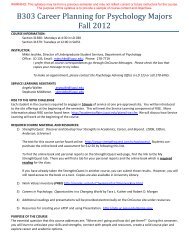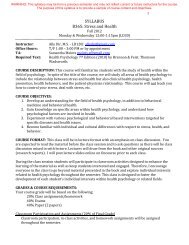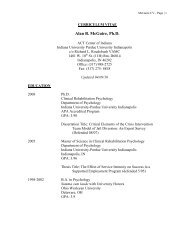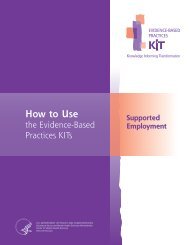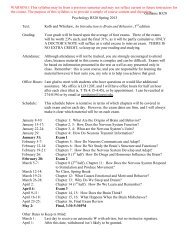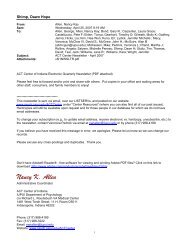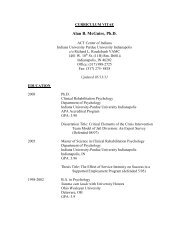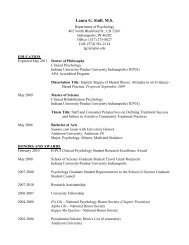Supported Employment: Training Frontline Staff - SAMHSA Store ...
Supported Employment: Training Frontline Staff - SAMHSA Store ...
Supported Employment: Training Frontline Staff - SAMHSA Store ...
You also want an ePaper? Increase the reach of your titles
YUMPU automatically turns print PDFs into web optimized ePapers that Google loves.
The overriding philosophy of SE is the belief that<br />
every person with a serious mental illness is capable<br />
of working competitively in the community if the<br />
right kind of job and work environment can be<br />
found. Rather than trying to sculpt consumers<br />
into becoming “perfect workers,” through<br />
extensive prevocational assessment and training,<br />
consumers are offered help finding and keeping<br />
jobs that capitalize on their personal strengths<br />
and motivation. Thus, the primary goal of SE is<br />
not to change consumers but to find a natural “fit”<br />
between consumers’ strengths and experiences and<br />
jobs in the community.<br />
As consumers succeed in working in the<br />
community, their self-perceptions often change,<br />
and they view themselves as workers and<br />
contributors to society. Furthermore, as people in<br />
the community see consumers working, consumers<br />
are less stigmatized for their mental illness and<br />
become more socially accepted.<br />
• <strong>Employment</strong> specialists help consumers look<br />
for jobs soon after they enter the program.<br />
Instead of requiring extensive pre-employment<br />
assessment, training or intermediate work<br />
experiences (like prevocational work units,<br />
Transitional <strong>Employment</strong> Positions, or sheltered<br />
workshops), employment specialists and<br />
consumers begin the job search rapidly.<br />
• Support from employment specialists continues<br />
as long as consumers want it. Participation<br />
in SE is not terminated unless requested by<br />
the consumer.<br />
• Jobs are seen as transitions. <strong>Employment</strong><br />
specialists help consumers find new jobs<br />
as needed.<br />
• SE programs are staffed by employment<br />
specialists who are a part of a clinical treatment<br />
team. <strong>Employment</strong> specialists meet weekly and<br />
communicate frequently with team members.<br />
• SE is individualized. All choices and decisions<br />
about work are based on consumers’ preferences,<br />
strengths, and experiences.<br />
Core components of<br />
<strong>Supported</strong> <strong>Employment</strong><br />
SE is a well-defined approach to helping people<br />
with mental illnesses find and keep competitive<br />
employment. Competitive employment means<br />
work in the community that anyone can apply for<br />
that pays at least minimum wage. The wage should<br />
not be less than the wage (and level of benefits)<br />
paid for the same work performed by people who<br />
do not have a mental illness.<br />
Evidence-based SE incorporates the<br />
following points:<br />
• SE programs help anyone who expresses the<br />
desire to work. Consumers are not excluded<br />
because they are not “ready” or because of prior<br />
work history, substance use, or symptoms.<br />
Active ingredients of<br />
<strong>Supported</strong> <strong>Employment</strong><br />
One of the unique features of SE is that the<br />
important characteristics of this evidence-based<br />
practice have been translated into program<br />
standards to help programs replicate SE.<br />
An instrument called the SE Fidelity Scale<br />
summarizes the basic characteristics of SE.<br />
The fidelity scale is available to help quality<br />
assurance teams assess how closely their program<br />
follows the SE model (See Evaluating Your<br />
Program in this KIT).<br />
Your SE leader will distribute this scale to you to<br />
review and discuss during training.<br />
<strong>Training</strong> Basic Elements <strong>Frontline</strong> and <strong>Staff</strong> Practice Principles 3 Module 1



